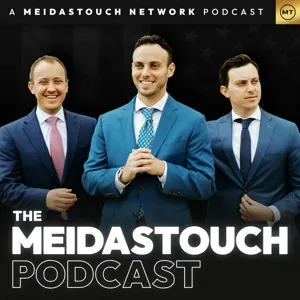Podcast Summary
Cocoa Prices Reach Record High After 47 Years: Cocoa prices have reached a record high, making chocolate more expensive and impacting the chocolate industry. A significant decision in India could also shape the upcoming election.
Cocoa prices have reached levels not seen since 1970, making it an expensive time for chocolate lovers. Alina Saliuk from NPR's business desk shared this indicator during a discussion on The Indicator from Planet Money podcast. The price surge has left many wondering about the causes and potential implications. Additionally, Darian Woods discussed a significant decision that could impact India's upcoming election. Stay tuned for more insights on these topics and more after the break. In simpler terms, the price of cocoa has reached a record high, last seen 47 years ago. This means chocolate is becoming more expensive, and it's been a long time since we last experienced such prices. This is an important indicator to keep an eye on for those in the chocolate industry and consumers alike. Furthermore, Darian Woods touched upon a major decision in India that could shape the upcoming election. More details on this topic will be discussed later in the episode. So, in summary, the rising cost of cocoa and a significant decision in India are two key indicators to watch out for.
Cocoa price surge: Decreased harvests, supply crunch, and increased costs: The price of chocolate has risen by 16% due to decreased cocoa harvests caused by extreme weather conditions in West Africa and increased costs for companies passing on these expenses to consumers.
The price of cocoa, a key ingredient in chocolate production, has been skyrocketing due to extreme weather conditions in West Africa, where most of the world's cocoa is grown. The weather has led to decreased harvests for the past three years, causing a supply crunch. Companies like Nestle, Hershey, and Mondelez have been passing on these increased costs to consumers, leading to an estimated 16% increase in chocolate prices over the past three years. The situation could worsen during holidays like Easter and Halloween, when demand for chocolate is high. The political landscape in India, another topic of interest, is also significant as the country is holding elections, leading to increased political spending.
India's BJP uses anonymous electoral bonds for campaign funding: The BJP's use of electoral bonds for anonymous corporate donations raises concerns of potential quid pro quo arrangements and lack of transparency in India's political process.
The ruling Bharatiya Janata Party (BJP) in India's upcoming elections has a significant advantage due to the use of electoral bonds, which allow large corporate donations to be made anonymously. These bonds, which function like vouchers for political donations, can be purchased at the State Bank of India and given to the desired political party. The identity of the donor remains concealed from the public, leading to concerns of potential misuse and lack of transparency. Economist Raghuram Rajan has criticized this system, raising issues of potential quid pro quo arrangements between donors and the government, such as easier loans or permissions. The Indian Supreme Court recently ruled these electoral bonds unconstitutional due to their lack of transparency, but it remains to be seen if this will lead to greater disclosure of donor information. Overall, the use of electoral bonds in India's political funding system raises concerns about the potential for undue influence and lack of transparency in the political process.
Lyft's Inflated Profit Margin Announcement: Inaccurate financial projections can lead to market disruptions, emphasizing the importance of double-checking important figures before public disclosure.
While transparency is crucial for businesses and investors, it's essential that the information shared is accurate. This week, the ride-hailing company Lyft experienced the consequences of inaccurate financial projections. The company announced a significant increase in profit margins, which led to a massive surge in stock prices. However, it was later revealed that the number was inflated by an extra zero, making it 500 basis points instead of the intended 50. Once the error was corrected, the stock price fluctuated, but eventually returned to its previous level. This incident highlights the importance of double-checking important financial figures before sharing them publicly. Additionally, it underscores the power of algorithms and automated trading systems, which can quickly react to new information, leading to significant market movements. Overall, while transparency is essential, it must be accompanied by accuracy to avoid potential market disruptions.
The unexpected boost of Lyft's 'oopsie moment': Even seemingly negative events in a company can unexpectedly boost its stock price, highlighting the complexity and unpredictability of the stock market.
Sometimes, even a seemingly negative event for a company can unexpectedly boost its stock price. This was the case with Lyft, whose momentary misstep during an earnings call was followed by a surge in its share price. This episode of the podcast "Planet Money" discussed this phenomenon, which the hosts referred to as the "oopsie moment" helping to "lift the stock." It's a reminder that the stock market can be influenced by a variety of factors, and even unexpected events can have significant impacts. Additionally, the episode touched on other topics, including the potential benefits of investing in real estate during high-interest rate environments, with the Fundrise flagship fund planning to expand its portfolio. Saatva luxury mattresses were also mentioned as a cost-effective alternative to more expensive brands, thanks to their online sales model. In summary, the key takeaway is that the stock market can be influenced by a multitude of factors, and sometimes, even seemingly negative events can have positive outcomes. It's important for investors to stay informed and be prepared for the unexpected.




